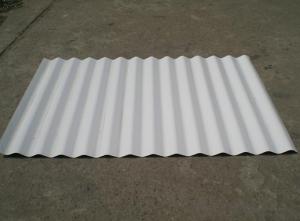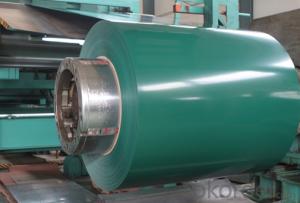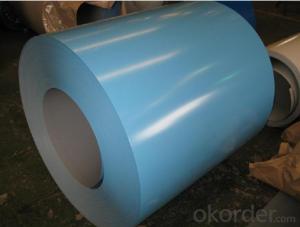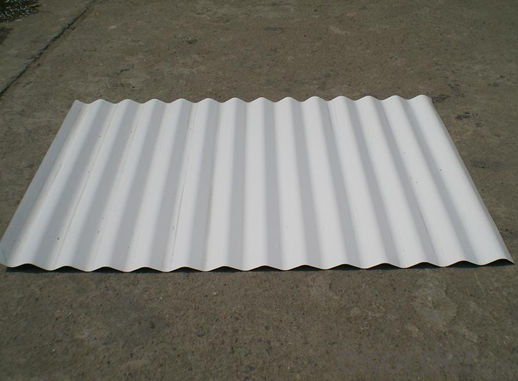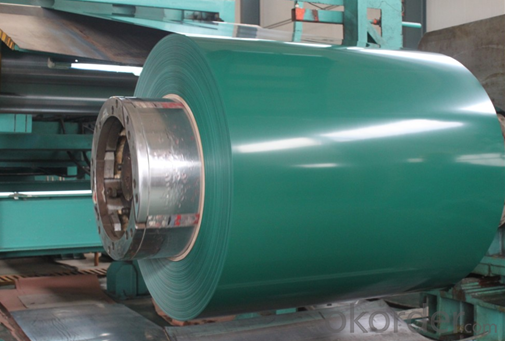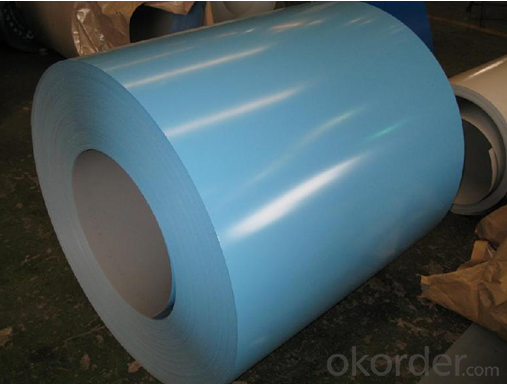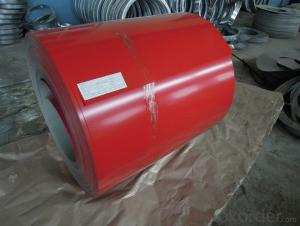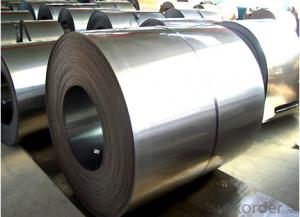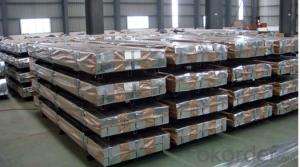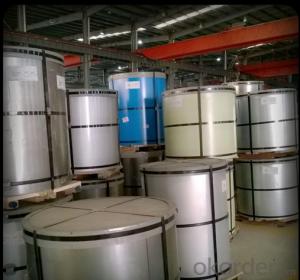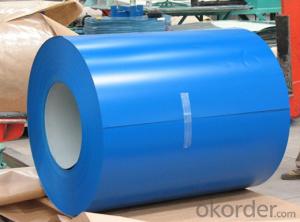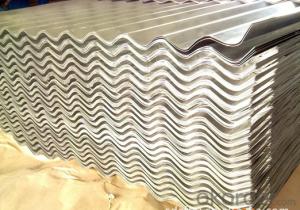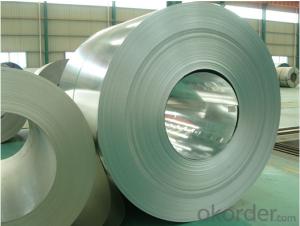Pre-Painted Steel Coil Thickness 0.3mm-2mm Width 1250mm
- Loading Port:
- China main port
- Payment Terms:
- TT OR LC
- Min Order Qty:
- 50 m.t.
- Supply Capability:
- 1000000 m.t./month
OKorder Service Pledge
OKorder Financial Service
You Might Also Like
Product Description
Specifications;
1. Aluzinc coating mass: 30g-275g/sqm
2. Coil weight: 4-6 tons per coil
3. Edge treatment: Mill edge or cut edge.
4. Technical treatment: Bright annealed, flatting, cold harden.
5. Surface treatment: Annealed, bright finish, dull/bright finish, slit edge.
6. Spangle: Normal/small/big/zero spangle.
7. Delivery terms: FOB / C&R / CIF
8. Supply Ability: 30000MT/month
9. Application: The construction industry: The roof structure, keel, grill, Clapboard, ceilings, fire shutter doors, etc; The light industry, the Automobile, agriculture, animal husbandry, fishery, casing of household Electronic application, civilian smoke stack, etc.
10. Delivery time: Within 30 days after the receipt of L/C or Signed the contract or according to customer's requirement.
Special design available according to requirement; Anti-corrosion And high-temperature resistant with black painting; All the production process Are made under the ISO9001: 2000 strictly
Second Glance of Photo
Galvanzied steel coil( GI, CRC)
Color coated steel coil(PPGI)
Package: Sea worthy Export Packing Standard export and seaworthy packing. (waterproof paper and metal sheet protection with fluted rings at inner and outer edges, 4 eye bands and 4 circumferential bands fasten the coil)
NAME | PPGI | GALVANIZED | GALVALUME/ALUZINC |
CERTIFICATE | ISO9001:2008 | ||
| EN10142 | ASTM A653 | ASTM A792 |
| CGCC | SS GRADE33-80 | GRADE33-80 |
MODEL NO | 0.16MM-1.5MM*1250MM OR UNDER | (0.12-1.5)*1250MM OR UNDER | 0.16MM-1.5MM*1250MM OR UNDER |
| Steel coil | Steel coil | Steel coil |
| Hot rolled-cold rolled | Hot rolled-cold rolled | Hot rolled-cold rolled |
SURFACE | Mini/regular/big/zero spangle, | Mini/regular/big/zero spangle, | |
APPLICATION | Structural use ,roofing, commercial use, household appliance, industry, family | ||
SPECIAL | Wear resistant steel, high- strength - steel plate | ||
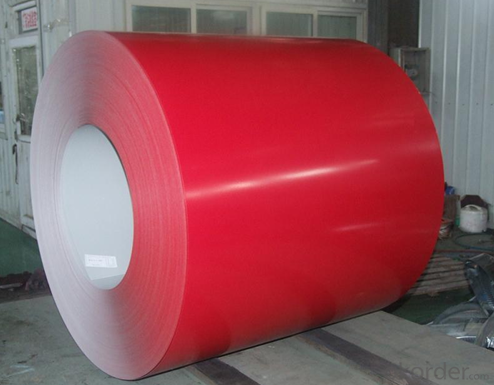
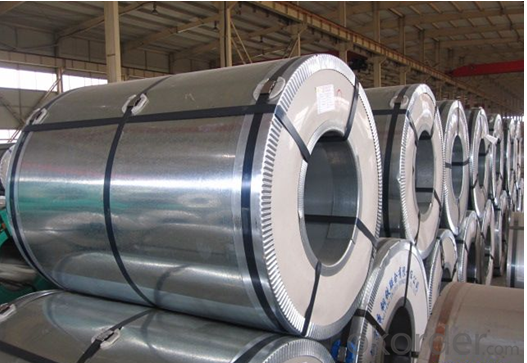
FAQ
What is the validity of your quotation?
Normally 1 days.
- Q: How are steel coils secured during transportation?
- Steel coils are typically secured during transportation using steel strapping, banding, or wire rope. These materials are tightly wrapped around the coils and fastened to prevent any movement or shifting during transit. Additionally, wooden or steel blocking may be used to further secure the coils and prevent them from rolling.
- Q: How many pounds can steel lift?
- It depends on the type of steel and the geometry of the item.
- Q: What are the applications of stainless steel coils?
- The unique properties and characteristics of stainless steel coils contribute to their wide range of applications across various industries. Here are some key areas where stainless steel coils are extensively used: 1. In the manufacturing industry, stainless steel coils play a crucial role in producing automotive parts, kitchen appliances, machinery components, and construction materials. The exceptional corrosion resistance and durability of stainless steel make it an ideal choice for these manufacturing applications. 2. The construction industry heavily relies on stainless steel coils for roofing, cladding, structural supports, and reinforcement. Stainless steel's strength, ability to withstand harsh weather conditions, and aesthetic appeal make it a popular choice in architectural designs. 3. The food processing industry commonly utilizes stainless steel coils for equipment like food storage tanks, conveyors, and processing machinery. Stainless steel's hygienic properties, resistance to corrosion, and ease of cleaning make it suitable for maintaining the purity and safety of food products. 4. In the chemical industry, stainless steel coils are extensively used due to their excellent resistance to corrosion from chemicals and harsh environments. They are employed in the production of storage tanks, pipelines, and reactors that handle various chemicals and corrosive substances. 5. The energy sector extensively employs stainless steel coils in power generation, oil and gas exploration, and renewable energy systems. They are used in heat exchangers, turbine components, pipelines, and offshore structures due to their high resistance to corrosion, strength, and longevity. 6. The medical and pharmaceutical industry relies on stainless steel coils for their biocompatibility and resistance to corrosion. Stainless steel coils are used in the production of surgical instruments, medical implants, and medical equipment that require sterilization and durability. 7. The automotive industry utilizes stainless steel coils for various components like exhaust systems, fuel tanks, catalytic converters, and structural parts. Stainless steel's high heat resistance, strength, and resistance to corrosion and oxidation make it suitable for these automotive applications. These examples highlight the extensive range of applications for stainless steel coils. Their versatility, durability, and resistance to corrosion make them indispensable in numerous industries where reliability and longevity are crucial considerations.
- Q: How are steel coils used in the production of metal cabinets?
- Steel coils are used in the production of metal cabinets as they serve as the primary raw material. These coils are unwound and cut into precise lengths, which are then formed, shaped, and welded to create the various components of the cabinet, such as the sides, back, and shelves. The steel coils provide the necessary strength, durability, and rigidity required for the construction of sturdy and long-lasting metal cabinets.
- Q: What is the maximum diameter of a steel coil?
- The maximum diameter of a steel coil can vary depending on the specific manufacturing process and equipment used. However, in general, the maximum diameter of a steel coil can range from a few inches to several feet.
- Q: Can steel coils be bent or formed into different shapes?
- Yes, steel coils can be bent or formed into different shapes through various processes such as rolling, bending, or stamping.
- Q: How are steel coils used in appliances?
- Steel coils are commonly used in appliances as a key component in the manufacturing of various parts such as heating elements, motors, compressors, and springs. These coils provide durability, strength, and flexibility to ensure the efficient functioning of appliances like refrigerators, washing machines, air conditioners, and stoves.
- Q: We all know that when we drop a small steel ball (size 3mm diameter; weight 1.10 grams) and a paper (size 11.7 inches length and 8.3 inches breadth; weight 4.5 grams) from a height. The steel ball will win the race to the ground due to its aerodynamic structure.Now imagine the same steel ball with the same weight converted to the structure similar that of paper. What will be the result? Which object will fall first; steel sheet or paper?
- The 2 objects will have the same size and shape. Therefore they will have the same air resistance. So the heavier object (the sheet of paper) will reach the ground first.
- Q: Search the internet for 'Frost Clipper Knife'. This knife comes in either stainless or carbon steel. I have a friend who has one (stainless steel) and he is very impressed with it, but I have heard that Carbon Steel blades are better? Discuss...
- There are different grades of Carbon Steel. A good grade is much harder than Stainless Steel and will stay sharp longer. It is also many times harder to get an edge on than Stainless Steel. I have had both and prefer the Stainless Steel because eventually the Carbon Blade does get dull, and you will wear out a Whet Stone trying to put the edge back on it. The Stainless Steel holds an edge an acceptable amount of time and is easier to sharpen when the time comes. Putting either knife through a can opener sharpener will ruin the edge and make it almost impossible to put another edge on the knife. Look closely and determine the angel of the bevel, then lay the knife bevel flat on a good whet stone and try to take a thin slice off of the stone. Turn the knife over and do the other side so you keep the edge centered on the blade. Keep turning the knife over and taking thin slices until it is sharp. Dress with a good quality sharpening steel.
- Q: How are steel coils inspected for weldability?
- Steel coils are inspected for weldability through a series of comprehensive tests and examinations. The main objective of this inspection is to assess the quality and suitability of the steel coils for welding processes. Firstly, visual inspection is conducted to identify any visual defects or irregularities on the surface of the coils. This includes checking for surface roughness, cracks, scratches, or any other imperfections that may affect the weldability. Next, destructive testing methods such as tensile testing and impact testing are performed. Tensile testing measures the strength and ductility of the steel, ensuring it meets the required mechanical properties for welding. Impact testing evaluates the steel's resistance to brittle fracture, which is crucial in determining its weldability. Furthermore, non-destructive testing techniques such as ultrasonic testing (UT) and magnetic particle inspection (MPI) are employed to detect internal defects and discontinuities. UT uses high-frequency sound waves to identify any hidden flaws within the steel, while MPI utilizes magnetic particles to identify surface and near-surface defects. Additionally, chemical analysis is carried out to determine the steel's composition and ensure it meets the required specifications for welding. This analysis involves checking the levels of carbon, manganese, sulfur, and other elements that may affect the weldability and overall performance of the steel. Moreover, weldability testing is performed to evaluate the steel's response to welding processes. This involves conducting various welding trials using different techniques and parameters to determine the steel's behavior during welding, such as its susceptibility to cracking, distortion, or other welding-related issues. Overall, the inspection of steel coils for weldability is a multi-faceted process that combines visual, destructive, non-destructive, chemical, and weldability testing methods. By conducting these thorough inspections, manufacturers can ensure that the steel coils meet the required standards and are suitable for welding applications.
Send your message to us
Pre-Painted Steel Coil Thickness 0.3mm-2mm Width 1250mm
- Loading Port:
- China main port
- Payment Terms:
- TT OR LC
- Min Order Qty:
- 50 m.t.
- Supply Capability:
- 1000000 m.t./month
OKorder Service Pledge
OKorder Financial Service
Similar products
Hot products
Hot Searches
Related keywords
